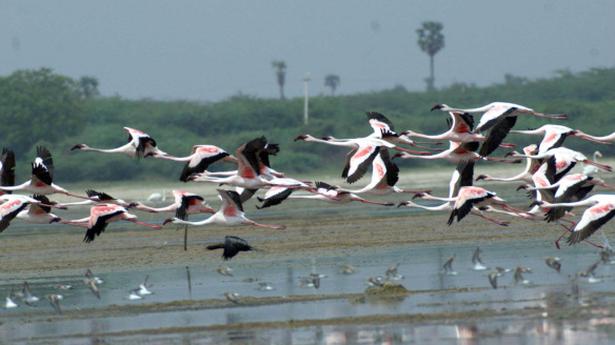
All eyes on Pulicat restoration project
The Hindu
The country’s second-largest brackish water lake is a victim of decades-long neglect
The continued neglect of Pulicat lake over several decades has cast a shadow not only on the livelihood of fishers depending on it for livelihood, but also on the arrival of migrant birds to this sanctuary.
Spread over 471 sq. km on India’s eastern coast, it is the second-largest brackish water lake next to Chilka. However, its shrinkage, both in terms of depth and area, is of concern. Due to the closing of the sea mouth at Rayadaruvu village in Vakadu mandal of Tirupati district, which is attributed to the siltation of sand bars, the water spread area has come down to 297 sq. km. In some places, the water level is just half a metre in depth, posing a serious threat to fisherfolk.
The surrounding wetland ecosystem has seen a huge degradation over the years that has directly impacted the livelihood of the 20,000 fisherfolk families living in the 20 Kuppam (hamlets) for generations, eking out a living with 1,100 country rafts.
Even the famed Salim Ali Centre for Ornithology and Natural History (SACON), which studied the impact of dredging on the Pulicat sanctuary, found it beneficial for furthering the bird ecosystem. It also recommended afforestation and mouth maintenance to ensure stable salinity levels to increase plankton and fish availability.
Member of Parliament (Tirupati) M. Gurumoorthy, who visited the lake and represented the issue to the Centre several times, explained to The Hindu that it could become a potential ecotourism spot by tapping a chunk of the tourists visiting Tirupati. “It can also serve as an ideal location for film shooting, given the proximity of Tamil, Telugu and Kannada film industries,” Dr. Gurumoorthy adds.
As water flow from the sea at the northern end dwindled, the fishermen started moving south during the March–June period, leading to frequent altercations with their counterparts in Tamil Nadu over fishing rights. As the southern portion (abutting Tamil Nadu) is deeper, it has water throughout the year, forcing the Andhra Pradesh fishers to resort to poaching, as the entire fish and prawn wealth accumulate down south. The inter-State ramifications have tossed the issue up, making it hog national headlines.











